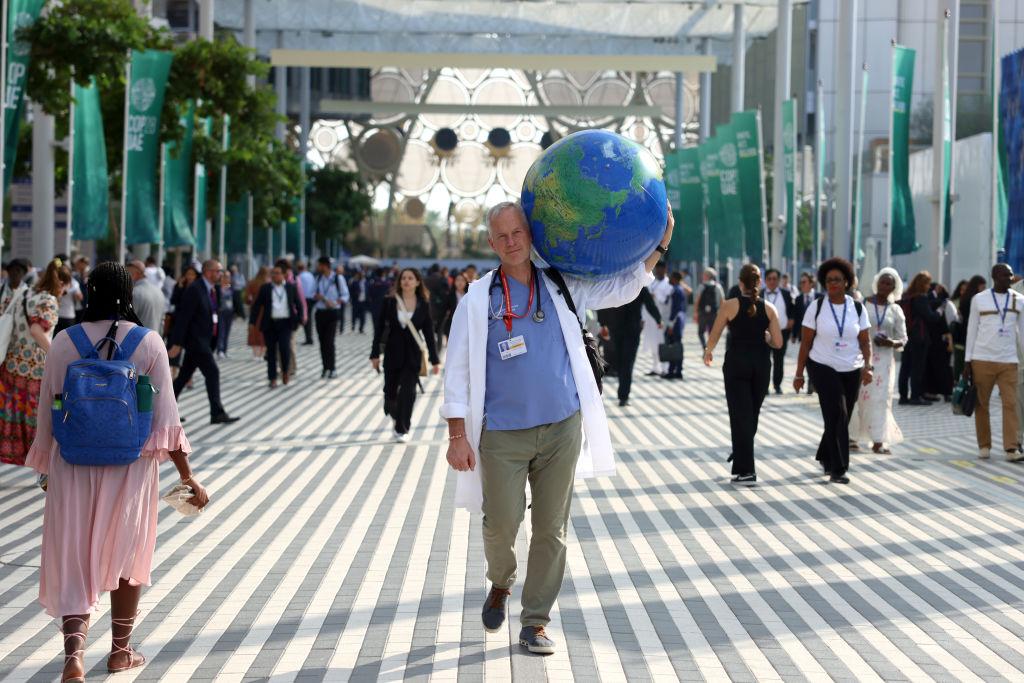
Planet A
This year’s UN climate conference, COP28, was the first to include a day of programming dedicated to the theme of health, relief, recovery and peace. The program provide an opportunity for health, aid and humanitarian workers and peacebuilders from various UN agencies, community-based organisations, think tanks and academic institutions to discuss how the links between climate change and conflict and how best to reflect conflict-related issues in climate-change policy.
Representatives from war-torn regions such as Gaza, Yemen, Syria and Ukraine used the event to spotlight the environmental impacts of war. Ukraine’s pavilion ran the slogan ‘ecocide’, with officials saying that 150 million tonnes of CO2, mostly from fuel and fires, had been emitted because of the invasion. They also drew attention to the degradation of nearly 30% of Ukraine’s forests caused by the war.
Addressing the nexus between conflict and climate change remains a challenging task. It’s not yet clear whether world leaders will adopt policy solutions that sufficiently ease the burden on destabilised regions. Steps they could take include prioritising climate-adaptation financing, supporting climate migrants, empowering local leadership and assisting with transboundary resource management.
Democracy watch
Protests erupted in Peru on the anniversary of a government crackdown that led to 49 civilian deaths. Allegations of corruption and elite capture have contributed to mass anti-government sentiment in the country. A November poll showed that just 83% and 82% of citizens approve of the president and the congress, respectively.
In a further blow to Peru’s fragile democracy, prosecutors allege that the country’s attorney-general, Patricia Benavides, coordinated a scheme in which lawmakers facing criminal investigations could be cleared if they agreed to appoint or dismiss certain judges. The situation is causing a political standoff amid growing unrest.
The government has declared a state of emergency through to at least 5 January. Some rights have been suspended, including rights to assembly, transit and freedom from warrantless searches, and the armed forces have been authorised to police any demonstrations.
Information operations
Since 2020, an India-based organisation calling itself Disinfo Lab has been running a covert campaign to discredit US-based critics of Indian Prime Minister Narendra Modi. Combining factual research with unverified assertions, it alleges that US government figures, researchers, humanitarian groups, and Indian American are conspiring to undermine India.
Despite positioning itself as unbiased, it’s been revealed that Disinfo Lab was set up and is operated by an Indian intelligence officer. Under the guise of exposing anti-India disinformation, it runs a clandestine influence operation. Its materials, favoured by right-wing Indians including Hindu nationalists, have achieved global reach through dissemination by high-profile figures, including officials from Modi’s Bharatiya Janata Party, former intelligence and military personnel, and a cabinet minister on social media platforms.
How aware these figures are of Disinfo Lab’s intelligence ties remains unclear. Disinfo Lab has denied any affiliation with government agencies, insisting it is as an independent organisation.
Follow the money
Australia will start negotiating a trade agreement with the United Arab Emirates in early 2024. The decision relates in part to the collapse of Australia’s trade talks with the European Union in October, with Canberra citing inadequate market access for its agricultural products.
Trade Minister Don Farrell emphasised the need for Australia to diversify its export markets and reduce its reliance on China. The UAE is Australia’s largest trading partner in the Middle East and offers lucrative opportunities, especially in the agricultural and industrial sectors, which currently face tariffs of up to 5%. In 2022, Australian exports to the UAE incurred $129 million in duties.
Meanwhile, China is lifting trade bans on most Australian red meat, signalling progress in easing tensions, though sanctions persist on small abattoirs and the lobster industry. China had banned imports of meat from 11 Australian abattoirs since 2020, citing cases of Covid-19 among staff and incorrectly labelled products. The government has welcomed the positive development but is continuing to urge China to lift the remaining bans.
Terror byte
In a militant attack on Tuesday, 23 Pakistani security personnel were killed in Daraban, a remote area in Pakistan’s Khyber Pakhtunkhwa province near the Afghan border. Tehreek-e-Jihad Pakistan, an affiliate of Tehrik-i-Taliban Pakistan, claimed responsibility for the assault, in which six terrorists targeted a security forces’ post.
After the military’s thwarting of the initial attempt to breach the post, the attackers resorted to ramming an explosive-laden vehicle into the site, followed by a suicide bombing. The blast severely damaged a military camp building, leading to multiple casualties. Subsequent Pakistani military operations resulted in the death of at least 27 terrorists.
In response to the attack, Pakistan issued a strong demarche to Afghanistan, attributing the attack to fugitive Taliban militants based across the border. The Pakistani government demanded immediate action against the attackers, urging Afghanistan to publicly condemn the incident. The interim Afghan government has yet to respond to these demands.